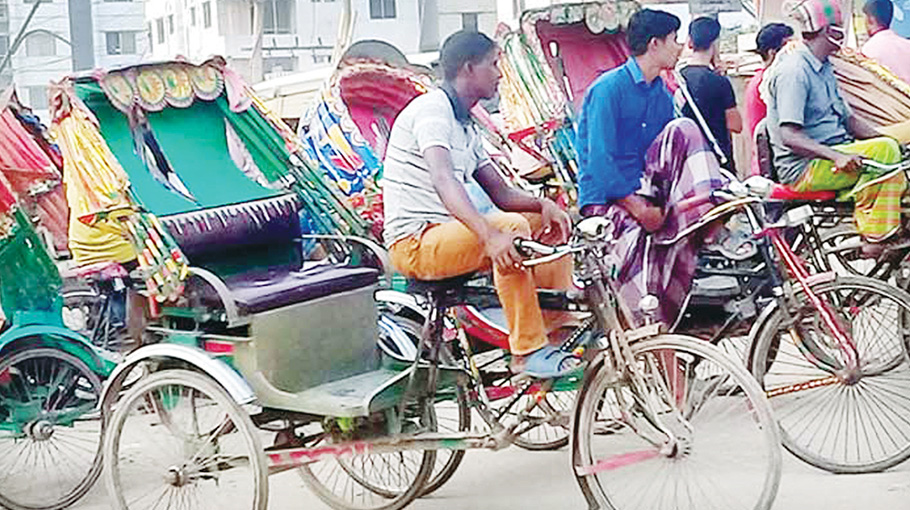Battery-powered rickshaws-Part 3
Can be legalised by adding safety measures

Despite their popularity and cost-saving benefits, these battery-operated rickshaws are still not officially recognized in the country, leading to occasional disputes between auto-rickshaw drivers and law enforcers.
Some people blame these vehicles, which can travel at high speeds on roads and highways, for causing accidents.
However, despite these concerns, the power division continues to promote these environmentally friendly vehicles
Experts said the government should consider streamlining the sector by making registration mandatory, adding safety features to vehicles, and restricting their movement on highways and busy roads.
Recently, State Minister for Power and Energy Nasrul Hamid in parliament defended the battery-run three-wheelers terming these vehicles made with indigenous technology as ‘Tesla of Bangla’.
“It may have mechanical faults. The return is much higher compared to the electricity that it is using. These are 40 lakh rickshaw pullers who are using electricity to earn,” he said. He further
said that the government is trying to shift from lead batteries to lithium batteries. “We are working on a project on this. We will supply them lithium batteries and take away the lead batteries,” he said.
The state minister defended these electric vehicles terming them cost-effective and environment-friendly.
He said “If it takes Tk 100 to reach a distance in an oil-powered vehicle, it would take Tk 20 to go that same distance in an electric vehicle.”
“Basically, we encourage electric cars to come to market as fast as possible,” the state minister said.
Last year, Tawfiq-e-Elahi Chowdhury, the prime minister’s adviser for power, energy and mineral resources, said a plan to licence battery-run auto-rickshaws by setting standards for the vehicles is at the final stages.
He said “There has been significant progress in the development of battery-powered auto-rickshaws. We gave BUET nearly Tk 30 lakh. They have set up a structural design featuring hydraulic brakes and backlights.”
“We have worked on how to keep the existing auto-rickshaws running and how to make new ones,” he added.
Dr Md Hadiuzzaman, Professor of the Department of Civil Engineering at BUET, told the Bangladesh Post, “If the government wanted to approve the battery-powered rickshaws, then they can be legalised by adding safety features to the vehicles and restricting their movement on highways and busy roads.”
He also said “We (BUET) are working on battery-operated rickshaw. We have developed a structural design of battery-operated rickshaw by adding various safety features.”
“There are some difficulties in the legalization process — who will provide a license to a battery-operated rickshaw, license for driving this is mandatory or not, and training is crucial for operating this vehicle,” said the BUET professor.
Monirul Islam Sumon, a regular passenger of battery-operated rickshaw, told the Bangladesh Post “Everyone knows that battery-powered auto-rickshaws are illegal. But this transportation reduces our travel expenses. Battery-powered autos can run in city alleys if the drivers are disciplined and disciplined.”
Dr Mainul Islam, an economist and former professor of economics at Chattogram University, said, “Battery-operated rickshaws and auto-rickshaws have become the main vehicles in many areas. I find this a very welcome change. Because, these vehicles to mitigate the physical stress of rickshaw pullers are a symbol of modernity on the one hand, and are environmentally friendly on the other hand.”
“It is not uncommon for a battery-powered rickshaw to suddenly brake and cause an accident. But in reality, if such accidents are very high, the rickshaw users would show reluctance to use battery-operated rickshaws. This problem has not been reported to be serious anywhere. However, like cycle rickshaws, their movement cannot be legalized on highways for obvious reasons” he added.
He also said “We see no reason to discourage this non-physical harassment-free system of employment for the most marginalized sections of the society. I urgently request the government to immediately provide ‘legal validity’ to battery-powered rickshaws and auto-rickshaws in rural areas and small roads in urban and metropolitan areas by enacting specific laws.”
He also said that the ban on battery-powered rickshaws and auto-rickshaws should be maintained on national highways, major highways in metropolitan cities and major roads in other cities.
Bashar Hossain, a resident of the Nandipara area who used to do office in the Motijheel area, said, “I can go to Motijheel by rickshaw. But the rent will be Tk 100 to Tk 150. But if I ride an auto rickshaw, I can reach Motijheel for just Tk 25 taka.”
Ragib Ahsan Munna, Central Adviser of Rickshaw, Van, Easybike Workers Union, said “By not issuing licenses for battery-powered vehicles by BRTA, the government is giving an opportunity to extortionists and dishonest police officers to oppress the workers.”
He immediately demanded a battery-powered vehicle license.




